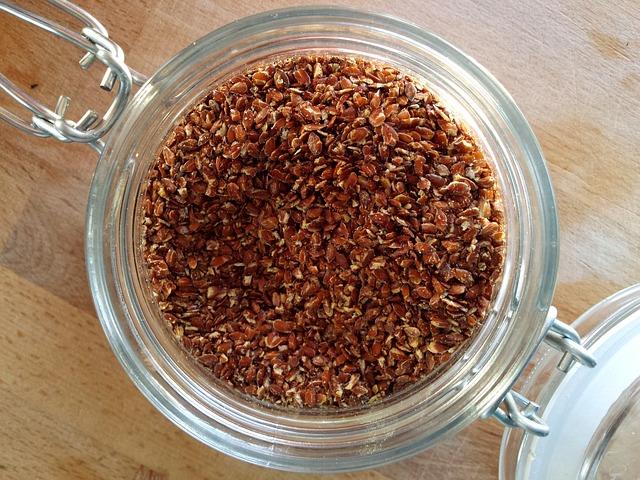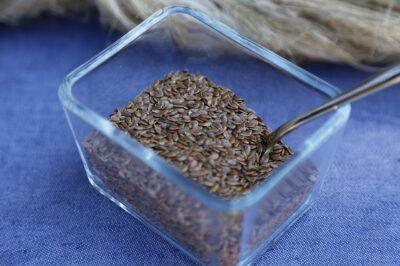|
Listen To The Article
|
They may be little but they are quite powerful. Flax seeds have been around for thousands of years and are still topping the charts as a delicious and nutritious superfood. Sometimes referred to as linseeds, these little brown gems contain the richest sources of plant-based Omega-3 fatty acids (sometimes called alpha-linolenic acid – ALA) on the planet.
The nutritional profile of flax seeds is nothing short of amazing. Here is a snapshot of what 1 ounce (3 tablespoons) of flax seeds contains:
- 3 mg Omega-3
- 8g fiber
- 6g protein
- 31 percent RDA vitamin B1
- 35 percent RDA manganese
- 30 percent RDA magnesium
- 19 percent RDA phosphorus
- 10 percent RDA selenium
Here are just a few reasons why you should consider consuming flax seeds daily.
1. Promotes weight loss
Flax seeds are in the same camp as walnuts when it comes to containing healthy fats and fiber. This will help you feel full longer and may lead to weight loss. In addition, the ALA fats may also help reduce inflammation. An inflamed body tends to retain excess weight.
The Amazing ‘Aztec Superfood’ Used By World-Class Survivalists
A study published in the Journal of Nutrition found that both flax seeds and walnuts help to reduce obesity. Try sprinkling a couple of teaspoons of ground flax seeds in smoothies, yogurt, salad and soups.
2. Flax Seed Improves digestion
You may have heard it said that health starts in the gut, and it is true. If your digestive system is out of whack, it is likely causing other health issues. Flax promotes healthy digestion and protects the lining of the digestive tract. People who suffer from Crohn’s disease or other digestive disorders will find that flax helps reduce inflammation and reduce symptoms. In addition, flax is rich in magnesium, which is also beneficial for digestive health. The fiber in ground flax seeds will help cleanse waste from your digestive system and provide food for beneficial bacteria in your gut.
3. Reduces menopausal symptoms
Lignans (antioxidants) found in flax have been shown to reduce symptoms that occur with menopause. They have even been used as an alternative to hormone replacement therapy. That’s not all; flax has also been found to reduce the risk of osteoporosis and help women maintain cycle regularity. Include one to two tablespoons of flax meal in a breakfast smoothie for all day relief.
4. Flax Seed Reduces cholesterol
A study published in the Journal of Nutrition and Metabolism found that adding flax seeds to your daily diet can reduce cholesterol levels. This is due to the fact that the soluble fiber in the seeds traps the fat and cholesterol in the digestive system and keeps it from being absorbed.
The soluble fiber also grabs bile, which is made from cholesterol, in the gallbladder. The bile is excreted through the digestive system, which forces the body to make more of it, using extra cholesterol in the blood – which lowers overall cholesterol.
5. Encourages healthy skin and hair
If you want shiny and healthy hair, try adding some flax seeds to your diet. The ALA fats in flax seeds provide essential fats as well as B-vitamins that help to moisturize your hair and scalp. If you suffer from dry skin, dry eye syndrome, eczema or acne, a daily dose of flax seeds can help. You can also add some flax seed oil to your diet; this gives you an even greater concentration of healthy fats than the ground seeds. Besides sprinkling ground flax on your food, mix a little essential oil with some flax oil and use as a moisturizer for radiant skin.
Don’t Forget to Grind Them
Many people ask if they can use flax seeds in their whole form. The issue with this is that when you consume whole flax, the body can’t digest the hard outer casing and break apart all of the goodness inside. Grind whole flax seeds in your blender or coffee grinder, store them in a cool dark place, and enjoy!
Do you eat flax seeds? Have you discovered other benefits? Share your tips in the section below:
Harness The Power Of Nature’s Most Remarkable Healer: Vinegar
 Off The Grid News Better Ideas For Off The Grid Living
Off The Grid News Better Ideas For Off The Grid Living





